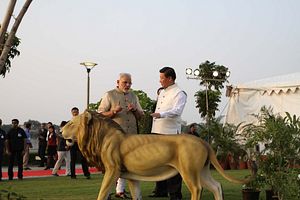There are murmurs in the Indian press that Indian Prime Minister Narendra Modi will head to Chinese in May for a high-level summit meeting with Chinese President Xi Jinping. If true, Modi would be meeting Xi for the first time since the two met at last year’s BRICS Summit meeting just days after Indian and Chinese troops “disengaged” from a long-running standoff at Doklam, a piece of territory disputed between Bhutan and China.
Today, troops from both sides remain at Doklam, but New Delhi has chosen to reduce the temperature with Beijing, pursuing what some observers have called a “reset” of sorts. Relations between the two countries reached a low point last summer, with matters getting to a point where semi-authoritative Chinese state media regularly made threats of war against India.
Later this month, Indian Defense Minister Nirmala Sitharaman and External Affairs Minister Sushma Swaraj are expected to travel to China to participate in a ministerial-level meeting of the Shanghai Cooperation Organization, where India became a full member in 2017. Moreover, India’s national security adviser, Ajit Doval, is also expected to visit China.
Amid all this, China made its usual expectations for India known. Geng Shuang, a spokesperson for the Chinese Ministry of Foreign Affairs, addressed the issue at a press conference earlier this week, where he specifically discussed Indian patrols in Arunachal Pradesh—territory administered by India, but claimed in its entirety by China as part of Tibet.
“Prior to the resolution of the border issue, it is hoped that the Indian side abides by the agreement protocol, respects and obeys the Line of Actual Control and refrains from hyping up the issue and works with China to jointly maintain peace and tranquility in border areas,” Geng said on Monday.
“China’s position on the Sino-Indian boundary issue is consistent and clear. The Chinese government has never acknowledged the so-called Arunachal Pradesh,” Geng added. “Both China and India are negotiating to resolve the boundary issue between the two countries and seek a fair and reasonable solution acceptable to both sides.” Geng’s remarks came after Indian reports pointed out the disagreement over the patrols in Arunachal Pradesh.
India’s perceived reset toward China, ultimately, has been somewhat overinterpreted. New Delhi sees the trajectory of bilateral ties in the aftermath of the Doklam standoff as more a sign of an aberration than a trend toward a new normal. Instead, India is managing ties with China as it always has, maintaining a careful balance between cooperation and competition.
New Delhi has good reasons to restore a working relationship with China, even as it continues to express its grievances over Chinese President Xi Jinping’s signature Belt and Road Initiative (BRI), parts of which overlap with territory that India and Pakistan disputed. (The China-Pakistan Economic Corridor, the BRI’s crown jewel, runs through Pakistan-administered Kashmir.)
Beijing, too, has reason to restore a working relationship with India now instead of ramping up tensions. As a U.S.-China trade war intensifies and the Trump administration appears to increasingly be veering toward competition with China, Beijing is better served by reducing the temperature with its southern neighbor.

































